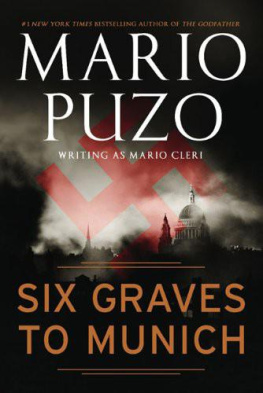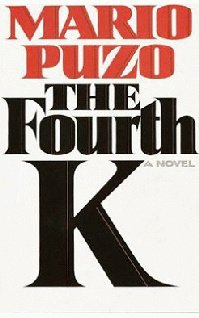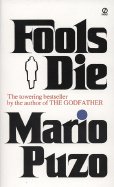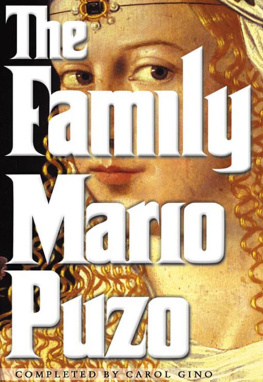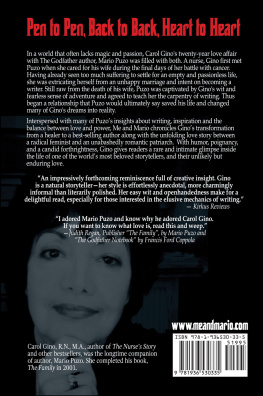ABOUT THE AUTHOR
The son of Italian immigrants who moved to the Hells Kitchen area of New York City, Mario Puzo was born on October 15, 1920. After World War II, during which he served as a U.S. Army corporal, he attended City College of New York on the G.I. Bill and worked as a freelance writer. During this period he wrote his first two novels, The Dark Arena (1955) and The Fortunate Pilgrim (1965). When his books made little money despite being critically acclaimed, he vowed to write a bestseller. The Godfather (1969) was an enormous success. He collaborated with director Francis Ford Coppola on the screenplays for all three Godfather movies and won Academy Awards for both The Godfather (1972) and The Godfather, Part II (1974). He also collaborated on the scripts for such films as Superman (1978), Superman II (1981), and The Cotton Club (1984).
He continued to write phenomenally successful novels, including Fools Die (1978), The Sicilian (1984), The Fourth K (1991), and The Last Don (1996).
Mario Puzo died on July 2, 1999. His final novel, Omerta, was published in 2000.
CHAPTER 1
Michael Rogan checked the lurid sign outside Hamburgs hottest nightclub. Sinnlich! Schamlos! Sndig! Sensual! Shameless! Sinful! The Roter Peter made no bones about what it was selling. Rogan took a small photograph out of his pocket and studied it by the red light of the swine-shaped door lamp. He had studied the photograph a hundred times, but he was nervous about recognizing the man he was looking for. People changed a great deal in ten years, Rogan knew. He himself had changed.
He went past the obsequiously bowing doorman into the club. Inside it was dark except for the blue movie flickering on a small rectangular screen. Rogan threaded his way through the crowded tables, the noisy, alcohol-stinking crowd. Suddenly the house lights came on and framed him against the stage, with naked blond girls dancing above his head. Rogans eyes searched the faces of those seated at ringside tables. A waitress touched his arm. She said coquettishly in German, Is the Herr Amerikaner looking for something special?
Rogan brushed past her, annoyed at being so easily spotted as an American. He could feel the blood pounding against the silver plate that held his skull togethera danger signal. He would have to do this job quickly and get back to his hotel. He moved on through the club, checking the dark corners, where patrons drank beer from huge steins and impersonally grabbed at the nearest waitress. He glanced into the curtained booths, where men sprawled on leather sofas and studied the girls on stage before picking up the phone to summon their favorite to join them.
Rogan was becoming impatient now. He didnt have much more time. He turned and faced the stage. Behind the nude dancing girls there was a transparent panel in the curtain. Through the panel the patrons could see the next line of girls getting ready to go on stage, and they applauded every time one of the girls took off a bra or a stocking. A voice called out drunkenly, You darlings, ah, you darlingsI can love you all.
Rogan turned toward the voice and smiled in the darkness. He remembered that voice. Ten years had not changed it. It was a fatty, choking Bavarian voice, thick with false friendliness. Rogan moved swiftly toward it. He opened his jacket and slipped off a leather button that gripped the Walther pistol securely in its shoulder holster. With his other hand he took the silencer out of his jacket pocket and held it as if it were a pipe.
And then he was before the table, before the face of the man he had never forgotten, whose memory had kept him alive the last ten years.
The voice had not deceived him; it was Karl Pfann. The German must have gained fifty pounds and he had lost nearly all his haironly a few blond strands crisscrossed his greasy patebut the mouth was as tiny and almost as cruel as Rogan remembered it. Rogan sat down at the next table and ordered a drink. When the house lights went out and the blue movie came on again he slipped the Walther pistol out of its holster and, keeping his hands under the table, fitted the silencer onto the pistol barrel. The weapon sagged out of balance; it would not be accurate beyond five yards. Rogan leaned to his right and tapped Karl Pfann on the shoulder.
The gross head turned, the shiny pate inclined, and the false-friendly voice Rogan had been hearing in his dreams for ten years said, Yes, mein Freund, what do you wish?
Rogan said in a hoarse voice, I am an old comrade of yours. We made a business deal on Rosenmontag, Carnival Monday, 1945, in the Munich Palace of Justice.
The movie distracted Karl Pfann, and his eyes turned toward the bright screen. No, no, it cannot be, he said impatiently. In 1945 I was serving the Fatherland. I became a businessman after the war.
When you were a Nazi, Rogan said. When you were a torturer... When you were a murderer. The silver plate in his skull was throbbing. My name is Michael Rogan. I was in American Intelligence. Do you remember me now?
There was the smash of glass as Karl Pfanns huge body swiveled around and he peered through the darkness at Rogan. The German said quietly, menacingly, Michael Rogan is dead. What do you want from me?
Your life, Rogan said. He swung the Walther pistol out from under the table and pressed it into Pfanns belly. He pulled the trigger. The Germans body shuddered with the force of the bullet. Rogan reset the silencer and fired again. Pfanns choking death cry was drowned out by the roar of laughter sweeping through the nightclub as the screen showed a hilarious seduction scene.
Pfanns body slumped over the table. His murder would not be noticed until the movie ended. Rogan slipped the silencer off the pistol and put both pieces in his jacket pockets. He got up and moved silently through the darkened nightclub. The gold-braided doorman saluted him and whistled for a taxi, but Rogan turned his face away and walked down the Allee toward the waterfront. He walked along the waterfront for a long time, until his pulse slowed its wild galloping. In the cold north German moonlight, ruined U-boat pens and rust-covered submarines brought back the terrible ghosts of war.
Karl Pfann was dead. Two down and five to go, Rogan thought grimly. And then ten years of bad dreams would be paid for and he could make peace with the silver plate in his skull, the eternal screams of Christine calling his name, calling for salvation, and the blinding, flashing moment when seven men in a high-domed room of the Munich Palace of Justice had put him to death as if he were an animal. They had tried to murder him, without dignity, as a joke.
The wind along the waterfront cut into his body and Rogan turned up the Reeperbahn, Ropemakers walk, passing the police station as he entered Davidstrasser. He was not afraid of the police. The light in the nightclub had been too dim for anyone to have seen him well enough to describe him accurately. Still, to be safe, he ducked into a side street that had a large wooden sign: Adolescents Forbidden! It seemed like any other street, until he turned the corner.
He had stumbled onto Hamburgs famous St. Pauli Alley, the city area set aside for legal prostitution. It was brilliantly lighted and thronged with strolling men. The gingerbread three-story houses seemed ordinary at first glance, except that parties were going on in all of them. The street-level floors had huge showcase windows, revealing the rooms within. Sitting in armchairs, reading, drinking coffee, and chatting, or lying on sofas and staring dreamily at the ceiling, were some of the most beautiful young girls Rogan had ever seen.


